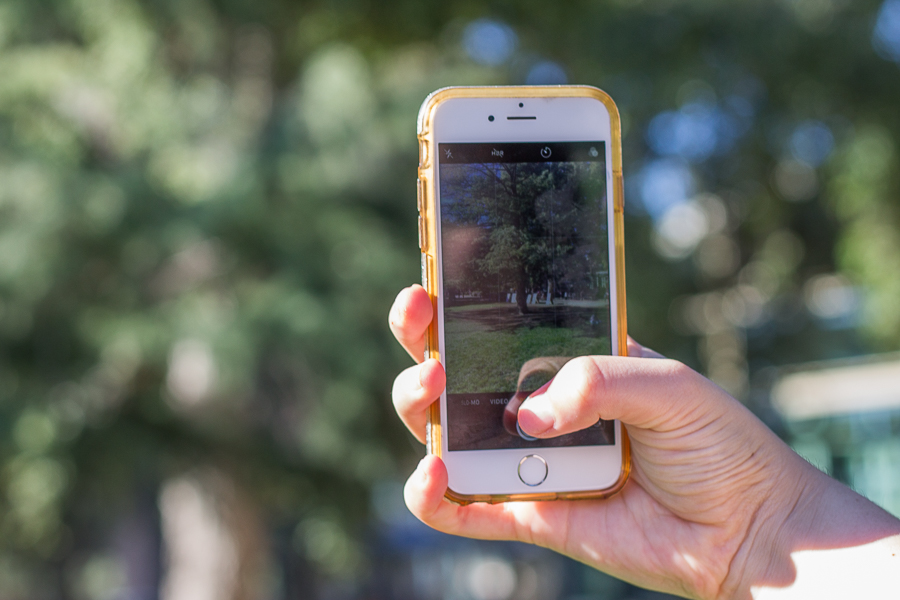
Is our technology keeping us from really experiencing nature?
 One day, while studying in the arboretum, I saw a couple of otters. They were swimming together, creating air bubbles underwater. They surfaced and ate fish on rocks. I watched them, and I noticed that onlookers began to get closer to the pair. The onlookers held up their cameras and watched through the screens. I admit that I managed to get a bad, pixelated photo from my spot on the grass, too. But I wondered why we couldn’t just watch the otters.
One day, while studying in the arboretum, I saw a couple of otters. They were swimming together, creating air bubbles underwater. They surfaced and ate fish on rocks. I watched them, and I noticed that onlookers began to get closer to the pair. The onlookers held up their cameras and watched through the screens. I admit that I managed to get a bad, pixelated photo from my spot on the grass, too. But I wondered why we couldn’t just watch the otters.
As technology advances and becomes more portable, people become more dependent on their devices — and more desperate for attention on social media. While technology has allowed people to experience nature in ways that were never before possible, it has also interfered with their relationship to the outdoors.
People don’t need to hike a mountain to enjoy the view from the top or take a trip to a lake to see the sun reflecting off its waves. They can scroll through photos on social media. They can experience nature online through live streaming and moment-by-moment updates. When they do go out in nature, they have their phones with them.
It’s common to see nature posts on social media. We love to share amateur photos of flowers. There’s no shame here, fellow shutterbugs. But when we take photos of flowers, we put the camera in between ourselves and the nature we are observing. We no longer see the flower. We see a copy of the flower. When we post that flower on social media, people “like” a version of the flower twice removed from the real flower. At that point, what happens to the real flower — do we care?
We’re often removed from the present, no longer experiencing nature — without thinking about the photo opportunity or the need to document our experience. It’s disappointing to see a cell phone camera blocking the view of a sunset or stunning a wild animal with a camera flash.
Technology is not to blame, though. We are. We should be spending more time in nature and away from devices. Nomophobics can bring along their phones for necessary use — for GPS or in case of an emergency — but we need the time to unplug.
There are side effects to avoiding the outdoors. Nature Deficit Disorder, not yet a recognized medical condition (it’s real enough, people), describes behavioral problems caused by spending too much time indoors. Nature Knowledge Disorder similarly relates to humanity’s shrinking knowledge of the natural world.
“We used to have natural processes, natural experiences in our life, and that seems to be becoming less common,” said Ross Cameron from the Department of Landscape at Sheffield University. “As biological beings we are physiologically adapted to be in certain environments — to run, to play, to hunt, to be active basically.”
Studies have shown that interacting with the outdoors or a green space has health benefits ranging from decreased stress to lowered blood pressure and heart rate. Researchers are now studying whether nature improves creative problem solving, too.
Besides, when we use our phones, we impair our ability to recognize danger in the wild.
Several years ago, while hiking Bald Mountain, I stopped to pose for a picture. The photographer encouraged me and two others to back up so that they could get a better angle. We heard a noise, turned and saw a rattlesnake creep into the bushes.
We should have been more careful. We were miles away from help.
We were fortunate. Others have not been so fortunate.
People have died for great selfies. They have fallen from cliffs, been struck by lightning and mauled by animals.
Others have simply underestimated danger while hiking and backpacking. They never realized that they were undernourished or dehydrated because they had their phones, which created a false sense of security.
The lesson: we need moderation. We should appreciate nature without letting technology interfere, and we need to know our boundaries with technology in the wild.
Whether I’m on a hike, in a backyard or crossing the street, I’m going to be present. If I see something particularly memorable, I hope I can resist the urge to take a picture and just enjoy the thing. And I’m going to try to give the otters their personal space.
Written by: Jess Driver — jmdriver@ucdavis.edu
Disclaimer: The views and opinions expressed by individual columnists belong to the columnists alone and do not necessarily indicate the views and opinions held by The California Aggie.




